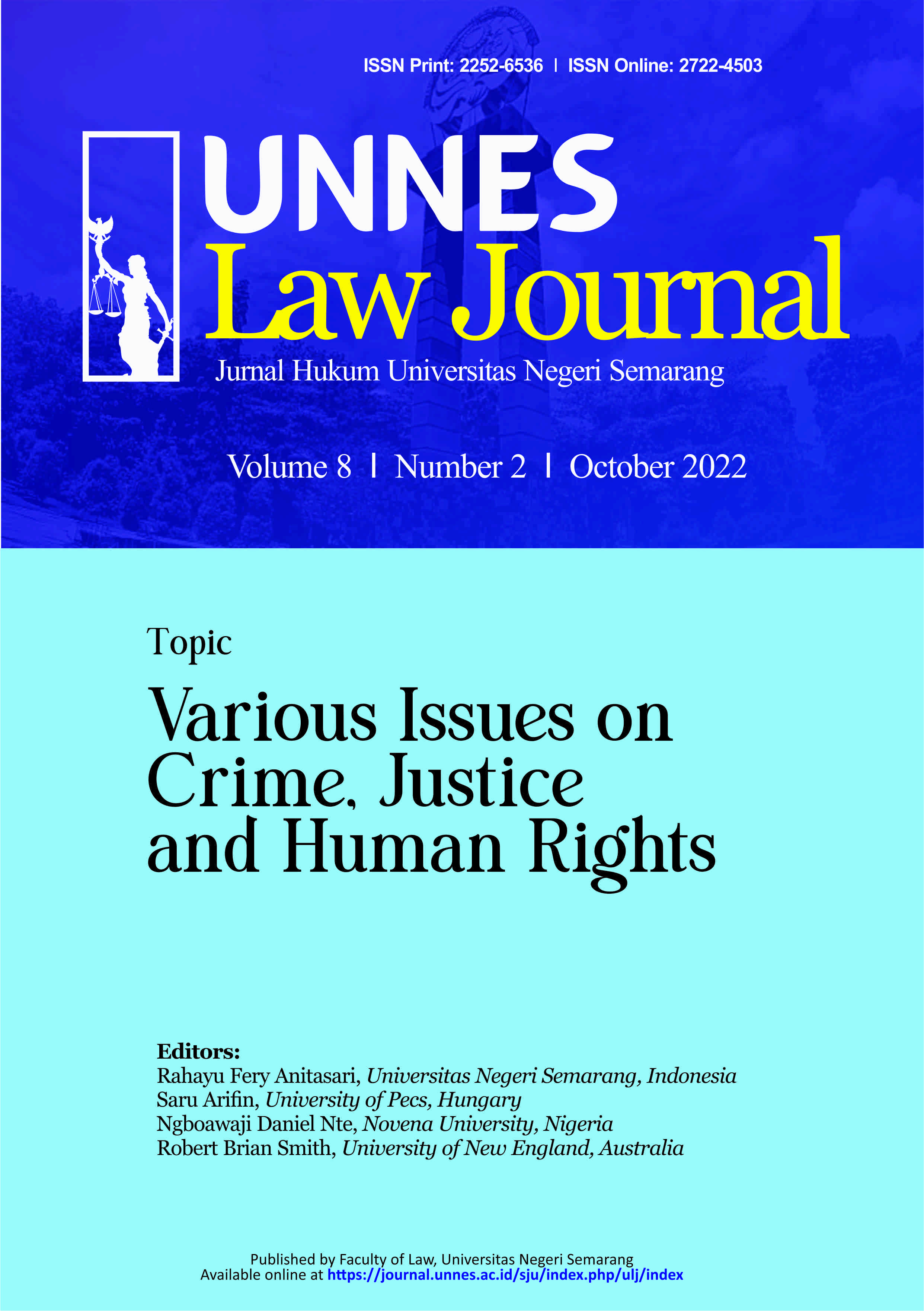Prospect and Challenges of Criminal Procedures in Nigeria: A Review Criminal Procedure Law, Law and Justice
Main Article Content
Abstract
Criminal Justice Procedure (CJP) can be described as the collective means through which a person accused of an offence passes until the accusations have been disposed of or the assessed punishment concluded. Arguably, CJP in Nigeria took an enviable turn around with the enactment of a new principal enactment, Administration of Criminal Justice Act (ACJA) which has repositioned the CJP in Nigeria by addressing the seemingly inadequacies in Criminal Procedure Act (CPA) and Criminal Procedure Code (CPC), harmonizing the CPA and CPC, codifying most age-long judicial pronouncements on CPA and CPC and addressing human rights abuses in erstwhile applicable laws thereby catapulting the CJP in Nigeria to an enviable position in the comity of nations. Recent judicial pronouncements in Nigeria on ACJA are worrisome and questions the readiness of the Judiciary as a stakeholder in Criminal Justice System to address the menace of delay in criminal trials which the ACJA aimed to address by introducing novel provisions target towards speedy dispensation of justice in criminal trials. The research methodology used in this study is systematic review and normative, by analyzing principal and secondary enactments in Nigerian CJP with judicial interpretations. While emphasizing the prospects of the ACJA, this paper also highlighted the challenges and suggested solutions to same. Despite its defects, the ACJA is a landmark development in the Nigerian Criminal Justice Procedure and all States of the Federation are therefore enjoined to domesticate the law.
Article Details
References
A Nwapa, ‘Building and Sustaining Change: Pretrial Detention Reform in Nigeria’ in Justice Initiatives (Open Society Justice Initiative, 2008).
A.M Adebayo, Administration of Criminal Justices System in Nigeria, (Lagos: Princeton Publishing Co, 2012).
Abiola Sanni, Introduction to Nigerian Legal Method, (ed. 1999) p.34.
https://ir.unilag.edu.ng/bitstream/handle/123456789/8359/INTRODUCTION%20TO%20NIGERIA%20LEGAL%20METHOD.pdf?sequence=1 accessed January 21, 2022.
Administration of Criminal Justice Act 2015 (ACJA), s. 2(1).
Administration of Criminal Procedure Law of Lagos State 2007.
Amnesty International UK, ‘Nigeria: Criminal Justice System is a “Conveyor Belt of Injustice” says Amnesty’; 26 February 2008 https://www.amnesty.org.uk/press-releases/nigeria-criminal-justice-system-conveyor-belt-injustice-says-amnesty accessed January 20, 2022.
B. Owasanoye & C. Ani, ‘Improving Case Management Coordination Amongst the Police, Prosecution and Court’, Online, http://www.nials-nigeria.org/journals/Bolaji%20Owasanoye%20%20andchinyere.pdf accessed January 20, 2022.
Bilz, Kenworthey, and John M. Darley, ‘What's Wrong with Harmless Theories of Punishment’, (2004) 79 Chi.-Kent L. Rev. 1215.
Bronsteen John, Christopher Buccafusco, and Jonathan Masur, ‘Happiness and punishment’ (2009) The University of Chicago Law Review pp. 1037-1082.
Cf. Hart, Punishment and the Elimination of Responsibility (Hobhouse Memorial Lecture, 1961).
Constitution of the Federal Republic of Nigeria 1999 (CFRN)
Coughlan Stephen, ‘The “Adversary System”: Rhetoric or Reality?(1993) Canadian journal of law and society, 8(2), 139–170.p. 142 doi:10.1017/s0829320100003203 accessed January 25, 2022.
Cullen, Francis T., and Paul Gendreau, ‘Assessing correctional rehabilitation: Policy, practice, and prospects,’ (2000) 3.1 Criminal Justice pp.299-370.
F. Adler, G.O.W. Mueller & W.S. Laufer, Criminal Justice: An Introduction (2nd Ed, McGraw Hill Higher Education, 2000).
Gerry Ferguson, ‘A Review of the Principles and Purposes of Sentencing in Sections 718-718.21 of the Criminal Code’ (2016) Department of Justice Canada https://www.justice.gc.ca/eng/rp-pr/jr/rppss-eodpa/RSD_2016-eng.pdf accessed January 25, 2022.
H. Okoeguale, ‘Criminal Justice in Nigeria: The Need for Administrative Dexterity’ (2015) 1 ABUAD Journal of Public and International Law (AJPIL), pp. 226- 227.
Ifeoluwa Olubiyi and Hilary Okoeguale, ‘Nigeria Criminal Justice System: Prospects and Challenges of the Administration of Criminal Justice Act 2015’ (2016) Vol. 1 African Journal of Criminal Law and Jurisprudence p. 3.
Imosemi & Kupoluyi, ‘Ensuring an Effective Criminal Trial and Investigation by the Nigeria Police Force: Challenges and Prospects,’ [2017] (5)(4) International Journal of Innovative Legal & Political Studies, 21-28.
J Kolber Adam, ‘The Subjective Experience of Punishment’ (2009) 109 Columbia Law Review 109 p. 182.
Jiang Na, ‘China’s Long March towards the Adversarial System: Establishment and Development’ (2014) 2 (4) Intel Prop Rights 2: 123 p. 4 doi:10.4172/2375-4516.1000123 https://www.walshmedicalmedia.com/open-access/chinas-long-march-towards-the-adversarial-system-establishment-and-development-ipr.1000123.pdf accessed January 25 2022.
Leclerc Charles and Jean-Francois Boivin, ‘Trends in the criminal justice system in Canada (2014)’, In Lowes D. & Das D. ‘Trends in the Judiciary: interviews with judges from Around the World’ (volume 2), (Taylor & Francis Group London: CRC Press, 2014) pp.281-295.
Mohammed Amali and Noose Nwafor-Orizu, ‘Need for Forensic Science in the Criminal Investigation Process in Nigeria’, Online https://ir.nilds.gov.ng/bitstream/handle/123456789/410/NEED%20FOR%20FORENSIC%20SCIENCE%20IN%20THE%20CRIMINAL.pdf?sequence=1 p. 185 accessed January 31, 2022.
NCJRS. ‘Understanding DNA Evidence: A Guide for victim service providers’ Online
Network on Police Reform in Nigeria and Open Society Justice Initiative, Criminal Force: Torture, Abuse and Extrajudicial Killings by the Nigeria Police Force (Open Society Institute, New York, U.S.A., 2010)
Network on Police Reform in Nigeria, ‘Criminal Force: An Interim Report on The Nigeria Police Force’, Online, http://www.noprin.org/NoprinPoliceSummary-10-Dec-07.pdf p.4 Accessed January 23 2022.
Nigerian Correctional Service Act 2019
Ogun State 2017, Administration of Criminal Justice Law 2010, Anambra State.
Okonkwo and Naish, Criminal Law in Nigeria (2nd ed. Spectrum Books Limited 2002).
Petherick, W A. Forensic Criminology (Elsevier Academic Press, 2010).
Robinson, Paul H, ‘Ongoing Revolution in Punishment Theory: Doing Justice as Controlling Crime’, (2010) 42 The Ariz. St. LJ p. 1089.
S Frase Richard, ‘Punishment Purposes’ (2005) Stanford Law Review pp. 67-83.
Shola Abu & 349 Ors v C.O.P, Lagos State (Unreported Suit No IKD/M/18 2003, ruling delivered on 28/07/2004 at the Lagos State High Court, Ikorodu Division).
The Criminal Procedure Act (CPA) which was for the Southern part of Nigeria was enacted in 1902 whereas the Criminal Procedure Code (CPC) of the North was enacted in 1960.
The Nigeria Police Force (Establishment) Act, 2020.
The President’s Commission on Law Enforcement and Administration of Justice, The Challenge of Crime in a Free Society (United States Government Printing Office, Washington D. C., February 1967).
Theories of Punishment’, https://www.cliffsnotes.com/study-guides/criminal-justice/sentencing/theories-of-punishment Accessed January 21 2022.
Verdun-Jones and Adamira Tijerino, ‘Four Models of Victim Involvement during Plea Negotiations: Bridging the Gap between Legal Reforms and Current Legal Practice’ (2004) 46 Canadian Journal of Criminology pp. 471-500 DOI:10.3138/cjccj.46.4.471
https://www.researchgate.net/publication/264041606_Four_Models_of_Victim_Involvement_during_Plea_Negotiations_Bridging_the_Gap_between_Legal_Reforms_and_Current_Legal_Practice, accessed January 25, 2022.
